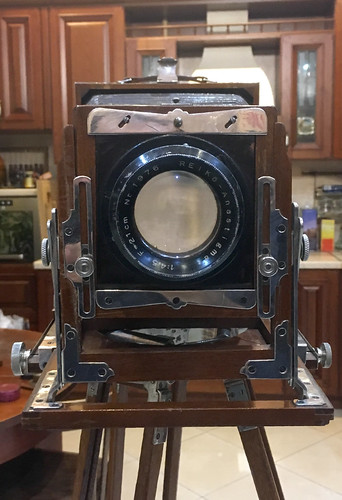Thanks all for your help and tips!! Highly appreciated.
More info about the camera.
It had the front wooden frame was broken, my guess someone closed this way:
And this two front knobs were pressed by the tripod holder tabs. This tripod has missing its locking screw so it can turn and if you are not aware after removing the tripod it ends this way, cracking the frame.
So I had to complete crack the whole frame to be able to glue it back (wooden glue) as wood has to be glued, letting the glue dry in both sides, stick and press during a day, no photos of how I did it sorry, cracks are still visible at a close look but it's firm now and I trust it will do fine.
This is how it has to be closed, I'm still looking for an screw to lock the tripod holder. Hard to get a bronze screw with nickel covering

About the ground glass, I did a quick measurement and my guess the matte side is outside to shoot with paper and those glass/crystal holders, I check both distances of the back holder with ground glass and the wooden holders and the papers should be located near the same distance of the matte side +-0.1mm, but I could measured badly. Only a shoot test as described will tell.
Scanner, I got a working 4990 and tomorrow I will get AntiNewton Glass so I will be able to make the holder (difference mm cardboard) at the right distance, Im placing emulsion face down but I'm open for experimenting.
What I plan with the camera, first shoot paper with it, rated ASA would be 2-3 but I cant do pre-flash the paper so I'm not sure if I could get some results at all.
How to measure ASA 2 or 3, should I follow a table like ASA 100->50>25>12>6>3? I mean measuring ASA 50 and go 4 stops open or 4 more speed slower, both my Digisix or Apps don't go 2 ASA so calculations have to be made.
Second step I would like to shoot dry plates (removing the glass at the holders and facing down the matte side of the ground glass plus some 0.xx mm on shims if required), I found a guy in USA who make them and all reviews are super.
My only problem with this paper and dry plates shooting is the 6 seconds of model stands still with natural light, firstly until spring no good light, winter sun light is too harsh.
The camera is bigger than the one 4x5, and the tripod is huge so Im working on an adapter to fit the camera in a modern tripod. I mean field work is harder to do and my home is far to be ready for shooting. Even making the bathroom as darkroom will require new door seals. Nothing undoable.
Another option is to let this camera go and do the same with the 4x5 at the moment and get a bigger (and standard size) later but I found this in such good state that's is a pity to let her go (now I have an offer for trade the camera and all the gear for a Fujinon SW 90mm f8 plus a 4x5 Polaroid holder).
My wife says I should focus in the cameras I want or just saying myself I'm a collector. I like to repair cameras but I like as well to shoot with em, having them in the shelves is something I don't like, but this discussion is another post I will open later

 R. Konishi field camera.
R. Konishi field camera.








